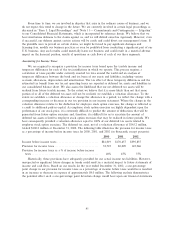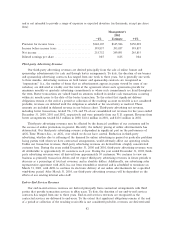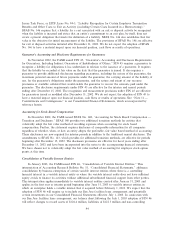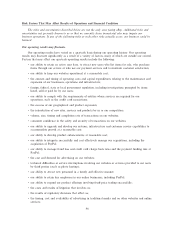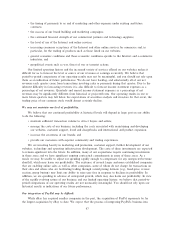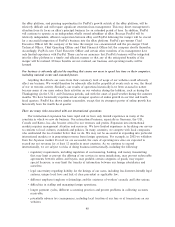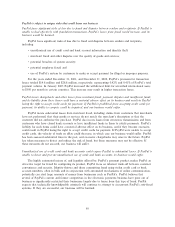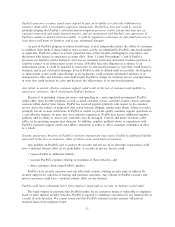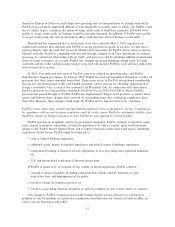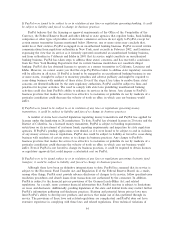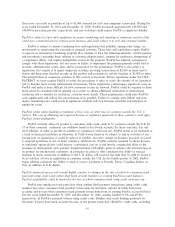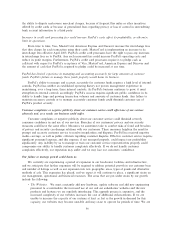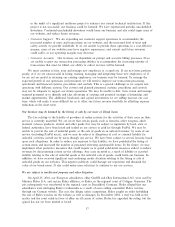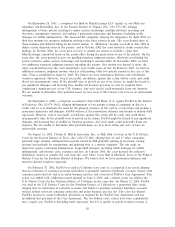eBay 2002 Annual Report Download - page 53
Download and view the complete annual report
Please find page 53 of the 2002 eBay annual report below. You can navigate through the pages in the report by either clicking on the pages listed below, or by using the keyword search tool below to find specific information within the annual report.PayPal's processes to reduce fraud losses depend in part on its ability to restrict the withdrawal of
customer funds while it investigates suspicious transactions. PayPal has been and could be sued by
plaintiÅs alleging that PayPal's restriction and investigation processes violate federal and state law on
consumer protection and unfair business practice, and are inconsistent with PayPal's user agreement. If
PayPal is unable to defend itself successfully, it could be required to restructure its anti-fraud processes in
ways that would harm its business, and to pay substantial damages.
As part of PayPal's program to reduce fraud losses, it may temporarily restrict the ability of customers
to withdraw their funds if those funds or their account activity are identiÑed by PayPal's anti-fraud models
as suspicious. PayPal is subject to several purported class action lawsuits challenging its procedures and
disclosures with respect to suspicious accounts (See ""Item 3: Legal Proceedings''), and if PayPal's
processes are found to violate federal or state law on consumer protection and unfair business practices, it
could be subject to an enforcement action or Ñnes. If PayPal loses this litigation or is subject to an
enforcement action, it could be required to restructure its anti-fraud processes in ways that would harm its
business, and to pay substantial damages. Even if PayPal is able to defend itself successfully, the litigation
or enforcement action could cause damage to its reputation, could consume substantial amounts of its
management's time and attention, and could require PayPal to change its customer service and operations
in ways that could increase its costs and decrease the eÅectiveness of its anti-fraud program.
Any failure to provide eÅective customer support could result in the loss of customers and inability to
attract new customers, which would harm PayPal's business.
Because it is providing a Ñnancial service and operating in a more regulated environment, PayPal,
unlike eBay, must provide telephone as well as email customer service, and must resolve certain customer
contacts within shorter time frames. PayPal has received negative publicity with respect to its customer
service and is the subject of purported class action lawsuits alleging, among other things, failure to resolve
promptly certain account restrictions. If PayPal is unable to provide quality customer support operations in
a cost-eÅective manner, its users may have negative experiences, PayPal may receive additional negative
publicity and its ability to attract new customers may be damaged. Current and future revenues could
suÅer, or its operating margins may decrease. In addition, negative publicity about or experiences with
PayPal's customer support could cause eBay's reputation to suÅer or aÅect consumer conÑdence in eBay
as a whole.
Security and privacy breaches in PayPal's electronic transactions may expose PayPal to additional liability
and result in the loss of customers, either of which events could harm its business.
Any inability on PayPal's part to protect the security and privacy of its electronic transactions could
have a material adverse eÅect on its proÑtability. A security or privacy breach could:
‚ expose PayPal to additional liability;
‚ increase PayPal's expenses relating to resolution of these breaches; and
‚ deter customers from using PayPal's product.
PayPal's data security measures may not eÅectively counter evolving security risks or address the
security and privacy concerns of existing and potential customers. Any failures in PayPal's security and
privacy measures could have a material adverse eÅect on our business.
PayPal could incur substantial losses from employee fraud and, as a result, its business would suÅer.
The large volume of payments that PayPal handles for its customers makes it vulnerable to employee
fraud or other internal security breaches. PayPal is required to reimburse customers for any funds stolen as
a result of such breaches. We cannot assure you that PayPal's internal security systems will prevent
material losses from employee fraud.
51


